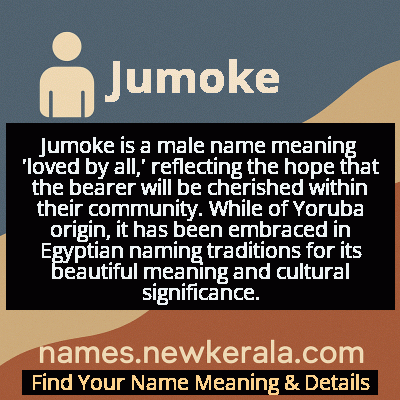Jumoke Name Meaning & Details
Origin, Popularity, Numerology Analysis & Name Meaning of Jumoke
Discover the origin, meaning, and cultural significance of the name JUMOKE. Delve into its historical roots and explore the lasting impact it has had on communities and traditions.
Name
Jumoke
Gender
Male
Origin
Egyptian
Lucky Number
3
Meaning of the Name - Jumoke
Jumoke is a male name meaning 'loved by all,' reflecting the hope that the bearer will be cherished within their community. While of Yoruba origin, it has been embraced in Egyptian naming traditions for its beautiful meaning and cultural significance.
Jumoke - Complete Numerology Analysis
Your Numerology Number
Based on Pythagorean Numerology System
Ruling Planet
Jupiter
Positive Nature
Optimistic, inspirational, and creative.
Negative Traits
Scattered, exaggerating.
Lucky Colours
Yellow, gold, purple.
Lucky Days
Thursday.
Lucky Stones
Yellow sapphire.
Harmony Numbers
1, 2, 9.
Best Suited Professions
Arts, writing, communication.
What People Like About You
Creativity, optimism.
Famous People Named Jumoke
Jumoke Odetola
Actor
Renowned Nollywood actor known for versatile roles in Nigerian cinema
Jumoke George
Business Executive
Successful entrepreneur and philanthropist in West African business community
Jumoke Adeyanju
Academic
Distinguished professor of African studies and cultural preservation
Name Variations & International Equivalents
Click on blue names to explore their detailed meanings. Gray names with will be available soon.
Cultural & Historical Significance
Extended Personality Analysis
Men named Jumoke typically develop personality traits that align with their name's meaning of being 'loved by all.' They often become natural social connectors who excel in building and maintaining relationships across different groups. Their emotional intelligence tends to be highly developed, allowing them to navigate complex social situations with grace and understanding. Jumokes are frequently described as having calming presences that make others feel comfortable and valued. They usually possess strong communication skills and an intuitive understanding of group dynamics, making them effective leaders who lead through inspiration rather than authority. While they are socially oriented, they also tend to have deep personal integrity and strong moral compasses that guide their interactions. Their ability to balance personal authenticity with social adaptability makes them respected and trusted figures in their communities.
Modern Usage & Popularity
In modern usage, Jumoke continues to be predominantly used within African communities while experiencing gradual international exposure. The name maintains strong cultural relevance in Nigeria while being increasingly adopted by Egyptian families who appreciate its positive meaning and cultural significance. Among younger generations, the name represents both cultural pride and modern identity, bridging traditional values with contemporary global consciousness. While not among the most common names statistically, Jumoke holds special significance for families seeking names with deep meaning and cultural heritage. Its usage patterns show consistency rather than dramatic trends, indicating it's chosen for its enduring qualities rather than passing fashions. The digital age has helped preserve and spread awareness of such culturally rich names, ensuring they continue to be meaningful choices for new generations.
Symbolic & Spiritual Meanings
The symbolic meaning of Jumoke extends beyond its literal translation to represent the fundamental human desire for connection and acceptance. It symbolizes the idea that true fulfillment comes from meaningful relationships and community integration. Metaphorically, the name represents the bridge between individual identity and collective belonging, suggesting that personal worth is enhanced through positive social contributions. In many African philosophical traditions, names like Jumoke embody the concept that human beings are fundamentally relational creatures whose identities are shaped through interactions with others. The name also carries symbolic weight as an example of cultural resilience and adaptation, representing how traditional values can find new expressions in changing social contexts while maintaining their core significance.

